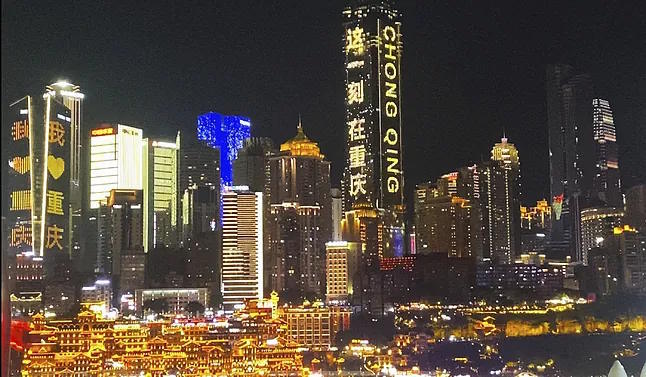Chongqing, a megacity in southwest China built on multiple levels over valleys and cliffs, has become one of the most Instagrammable places in the world. It is one of the trendiest ultra-modern metropolises, attracting travelers from increasingly more corners of the planet. It is chaotic, cheap, and safe. But just over a decade ago, it presented a very different face: it was one of the epicenters of organized crime in East Asia.
"Many politicians, judges, and police officers in Chongqing were on the payroll of the triads, which extended their influence to other parts of southern China and Southeast Asia," explains Wei Shihao, a spokesperson for the local section of the Ministry of National Security.
At the helm of the most dangerous of these mafias was an eccentric and powerful woman, Xie Caiping, known to all as the godmother of the underworld. Since the late 1990s, Xie, always accompanied by a retinue of young bodyguards and lovers, ran an extensive network of illegal casinos and loan offices.
To many high-ranking officials and police commanders, in exchange for privileged information and looking the other way, she offered hefty bribes. She also forced local entrepreneurs to pay for protection. If they refused, they were threatened, kidnapped, or killed by her henchmen.
Xie believed she was untouchable. And so she was until 2009 when a young and promising politician named Bo Xilai arrived in Chongqing as the Communist Party (CPC) chief. Aware that the triads had taken advantage of the country's economic boom to infiltrate various projects, from transportation to construction, the new city leader, who portrayed himself as incorruptible, launched a campaign against mafias and corruption a year after taking office, an unprecedented move in the giant Asian country.
The first thing Bo did was to clean up the local politics, police, and judicial system. He expelled dozens of officials and replaced them with others with impeccable resumes recruited from other regions of China. After the internal sweep, he sent a clear message to all gangs pointing towards the most famous criminal face: that of the godmother of the underworld.
"The big fish of organized crime fell one after another thanks to honest and brave police officers who were transferred to Chongqing and had no debts or fear of the mafias," recalls the Ministry spokesperson.
Xie Caiping was arrested in 2010 and sentenced by a court to 18 years in prison for multiple crimes. The case, widely covered by state media, began to portray Bo as the great scourge of mafias. His crackdown on crime shut down illegal casinos, removed thousands of forced prostitutes from the streets, and suffocated criminal networks to the point where they permanently migrated to Southeast Asia, mainly settling in countries like Myanmar and Cambodia, where they have thrived in recent years through drug trafficking, human trafficking, and telecommunications scams.
Chongqing, like the rest of China's major cities, now boasts street security. The fight against corruption remains very present, but the power of the triads has disappeared. There are surveillance cameras everywhere, and in commercial neighborhoods, it is common to see agents patrolling accompanied by robot dogs, equipped with facial recognition technology. Recently, the Chongqing Police announced that they had successfully trained a group of drug-detecting squirrels, which, they claimed, can perform even better than canine agents.
"Six well-trained squirrels are now ready to take on even the most challenging tasks, reaching high areas and narrow corners where packages filled with drugs are hidden and where detector dogs cannot reach," explained one of the police officers who trained the tracking squirrels. "Their sense of smell is quite acute. When they detect any suspicious package, they scratch it to alert us."
Chongqing was a national example of how to eradicate organized crime. Bo, the architect of the successful campaign, was even considered a strong candidate for a seat on the Politburo Standing Committee, the country's top leadership body, and perhaps to become the president of the Asian superpower today. But this never happened because Bo was engulfed in a dark novel-like chapter that was one of the biggest scandals to shake China in this century.
In 2012, the politician's wife, an influential lawyer named Gu Kailai, was accused of murdering British businessman Neil Heywood, who had been a close associate of the family. Gu allegedly poisoned him after an economic dispute. The case was exposed by Wang Lijun, then police chief and right-hand man of Bo, who fled to the US consulate in Chengdu. There, he sought political asylum after revealing the crime and corruption surrounding the Chongqing leader.
Bo was removed from his position and in 2013 stood trial accused of bribery, corruption, and abuse of power. He was sentenced to life imprisonment, the same penalty that Gu received for the murder of the British businessman. Many analysts, both inside and outside China, then agreed that Bo's downfall, beyond his wife's crime, was actually related to a power struggle in Beijing's high political circles. Many bigwigs of the CPC, especially those from the faction led by the current president Xi Jinping, saw Bo as a threat because he represented a more populist and open line.
